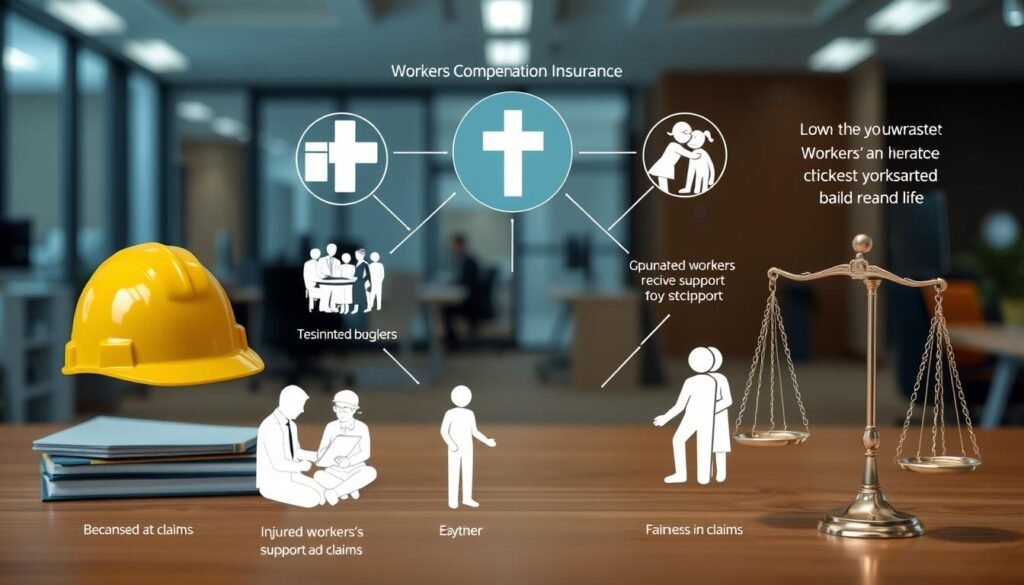Do you know What Is Workers Compensation Insurance Aupeo? Workers compensation insurance Aupeo is a policy covering medical costs, lost wages, and rehabilitation for employees injured at work, while protecting employers from lawsuits. It is legally required in most states.
This insurance covers many injuries and illnesses from work. It includes accidents and diseases from harmful work conditions. Both full-time and part-time workers are usually covered, proving that part-time workers are not left out. It’s important to know it only covers work-related dangers, not other health issues. Knowing who can get it and why is key to getting benefits. The process of filing a claim has strict rules and paperwork, so it’s important to follow them.
At Aupeo, I’ve explored this coverage deeply to give you a full view of its importance. I aim to give you insights that help with legal needs and make workplaces safer.
Experts say workers’ compensation usually pays 50% to 70% of an injured worker’s salary. It helps with money needs while recovering. But, some businesses, like those in agriculture, might not have to have it in some states. For very serious injuries, there are options like permanent disability payments or a lump-sum settlement.
Table of Contents
ToggleKey Notes
- Workers compensation insurance Aupeo protects employees from financial hardships due to work-related injuries.
- Both full-time and part-time workers are eligible under this insurance program.
- It’s essential to differentiate workers compensation from disability and private health insurance.
- Accurate documentation is critical for successful claims processing.
- Understanding state-specific laws can help businesses comply with legal obligations regarding coverage.
Understanding Workers Compensation Insurance
Workers compensation insurance is vital to making workplaces safer and supporting employees. It helps cover the costs of work-related injuries or illnesses. This includes medical bills, rehab, and pay for lost wages. Employers pay premiums based on the job risks their workers face.
Knowing the benefits of workers compensation insurance helps everyone. For workers, it means help with lost wages, medical bills, and rehab. This keeps them financially stable during tough times. Employers stay on the right side of the law and create a safer work environment. They can also lower their insurance costs by focusing on safety and training.
| Coverage Aspect | Description |
|---|---|
| Medical Expenses | Covers costs arising from medical treatments and care related to workplace injuries. |
| Wage Replacement | Provides partial compensation for lost income while recovering from a work-related incident. |
| Rehabilitation Services | Includes support for employees undergoing physical therapy or vocational rehabilitation. |
| Death Benefits | Offers financial support to beneficiaries in case of an employee’s work-related death. |
It’s important to understand how workers compensation insurance helps with workplace safety and employee care. This insurance is different from health and disability insurance because it focuses on work-related incidents. Knowing about it encourages a focus on employee wellbeing in the workplace.
What Is Workers Compensation Insurance Aupeo
Workers compensation insurance Aupeo covers the costs of medical care, lost wages, and rehab for work-related injuries or illnesses. This coverage includes things like hospital bills, surgery, and therapy, giving peace of mind to both workers and employers. It also helps protect employers from legal issues and lawsuits.
How Aupeo Workers Comp Works
(Visual Flow for Employees & Employers)
Step 1: Injury Occurs
- Employee reports injury → Supervisor logs incident in Aupeo’s app.
Step 2: Medical Care
- Aupeo partners with 20k+ clinics → $0 upfront costs for employees.
Step 3: Claim Review
- AI-powered system checks:
✅ Work-related?
✅ Timely reporting?
✅ Documentation complete?
Step 4: Benefits Activated
- Direct deposits for wage replacement.
- Automatic bill pay to hospitals.
Step 5: Return-to-Work
- Aupeo assigns case manager → 83% back to work in <30 days.
How it Works in the Event of an Injury
If you get hurt at work, tell your supervisor quickly. You must report it within 24-48 hours and fill out the right forms. Waiting over 30 days to report might mean your claim gets denied. Treatment depends on how bad the injury is, with minor ones usually treated locally and serious ones needing special care.
After an injury, it’s important to talk with your employer. Let them know when you’re ready to come back to work. Regular safety checks and following OSHA rules can lower risks and save money.
The Purpose of Workers Compensation Insurance
The main goal of workers compensation insurance Aupeo is to keep employees safe at work. It helps them get the medical care they need and keeps them financially stable while they heal. Laws in many places require employers to have this insurance to avoid fines and legal trouble. The construction industry sees the most workplace accidents, showing how vital this insurance is in risky jobs.
Legal Requirements and Compliance
It’s vital for employers and employees to know the legal rules about workers compensation. In many places, employers must have this insurance to protect their workers and follow the law. Using AUPEO technology can make handling these rules easier and improve how claims are handled. Staying in line with the law helps avoid lawsuits and makes the workplace safer. Since laws differ by state, employers need to keep up with their insurance duties to stay compliant with the law.

Benefits of Workers Compensation Insurance
Workers compensation insurance offers many benefits for both employees and employers. It makes the workplace healthier and boosts productivity. It’s important to know these benefits for a better work environment.
Financial Protection for Employees
Workers compensation insurance helps employees by covering medical costs for work injuries or illnesses. It pays for hospital visits, treatments, prescriptions, and equipment. This relieves the stress of medical bills, letting workers focus on getting better.
It also covers lost wages, helping workers keep up with their income during recovery.
Support for Employers
Employers gain a lot from workers compensation insurance too. It shields them from lawsuits over workplace injuries and helps manage employee health and safety. By focusing on safety and training, employers can cut down on injuries and lower insurance costs.
This approach also builds a safety culture, boosting morale and productivity.
Reduction of Legal Risks
Workers compensation insurance greatly reduces legal risks for everyone. It follows state laws that vary widely. By having this insurance, employers meet their legal duties and avoid legal problems.
This coverage gives employers peace of mind as they handle their work duties.

Workers Comp Insurance Explained
Workers compensation insurance is vital for both workers and employers. It helps workers get medical care and sometimes, money for work-related injuries or illnesses. If an injury happens while doing job tasks, it’s covered by workers comp.
Types of Coverage
There are several types of workers comp coverage that help:
- Medical Expenses: Covers treatment and rehab costs for work injuries.
- Rehabilitation Benefits: Helps employees recover and get back to work.
- Wage Replacement: Gives income support while recovering from injuries.
Businesses need to have safety programs to lower their insurance costs. Small businesses pay about $45 a month, while the average is around $67. Safe work environments can lead to lower insurance costs.

Workers Comp Coverage Aupeo
It’s crucial for employers and employees to grasp the full scope of workers comp coverage Aupeo. This insurance covers various workplace injuries and supports workers in their recovery.
Medical Expenses Coverage
Medical expenses coverage is a vital part of workers comp Aupeo. It covers doctor visits, surgeries, and other treatments. Workers’ compensation insurance AUPEO helps with work-related injuries and illnesses. This coverage eases the financial stress of recovery, letting workers get the medical care they need.
Rehabilitation and Recovery Support
Rehabilitation support is another key part of Aupeo coverage. It helps workers get back to their jobs. Including rehab costs in coverage makes it easier for workers to return to work. Employers also gain by having less liability when they offer this support, helping everyone’s goal of getting workers back to work.
Wage Replacement Benefits
Workers comp Aupeo also includes wage replacement benefits. These benefits lessen financial stress during recovery. They make sure injured workers keep getting paid while they can’t work. It’s important for workers to know about these benefits to get the support they need for a full recovery.
How to Claim Workers Comp Insurance
Filing a workers compensation claim might seem tough at first, but it’s easier if you know the steps. I’ll guide you through the process and what documents you need. This will help you file your claim smoothly.
Step-by-Step Claim Filing Process
- Tell your employer about the incident within 30 days to start the claim process.
- Send Form C-3 to the Board within two years after the incident to make your claim official.
- Use the online option to file your Employee Claim (Form C-3), which is the quickest way.
- Collect medical reports that explain your injury’s details.
- Keep records of what you were doing at work when you got hurt to link it to your job.
- If you have had similar injuries before, file a Limited Release of Health Information (Form C-3.3).
Common Documentation Required
Getting the right documents is key to filing your claim. Workers comp covers medical bills, rehab, and lost wages. Here are the important papers you should have:
| Document | Description |
|---|---|
| Medical Reports | Shows the type and severity of your injuries. |
| Incident Report | Details of what happened during the accident. |
| Employee Claim (Form C-3) | Your official request for compensation, which you can file online. |
| Limited Release of Health Information (Form C-3.3) | Used for documenting repeat injuries. |
| Employer Statement | Confirms your work activities during the injury. |
Understanding Eligibility for Workers Compensation
Knowing if you’re eligible for workers compensation is key for those who get hurt at work. Most people need to work to get this kind of insurance. It covers both full-time and part-time jobs.
Most states say you must have workers’ compensation insurance. This law helps protect both workers and employers. If you don’t follow these rules, you could face big fines or even criminal charges.
Some companies pay more in premiums if they have more employees or if they get more claims. This is because they’re seen as riskier. Knowing this helps everyone make smart choices about insurance. It’s good for both workers and employers.
Checking on workers compensation eligibility regularly is a smart move. It helps keep everyone safe and ready for any work-related injuries.
Workers’ compensation is like a safety net for those hurt at work. Learning about it helps with filing claims and following the law at work.
Common Exclusions Under Workers Compensation Insurance
Workers compensation insurance is meant to protect employees from work-related injuries. But, it’s key to know what’s not covered. Many workers might not realize that injuries from outside work aren’t covered. For example, injuries during a regular commute aren’t covered unless it’s for work-related tasks. Knowing these exclusions helps set clear expectations about what insurance covers.
Injuries Outside of Work Duties
Claims for injuries during personal time or outside work often get denied. It’s crucial to understand the details of workers compensation insurance. The coverage and risk assessment vary across industries, affecting what counts as a work-related injury.
Self-Inflicted Injuries and Misconduct
Self-inflicted injuries and those from misconduct are usually not covered. This shows the need for professional behavior and following safety rules at work. Knowing about these exclusions and their consequences helps employees understand their coverage limits.








